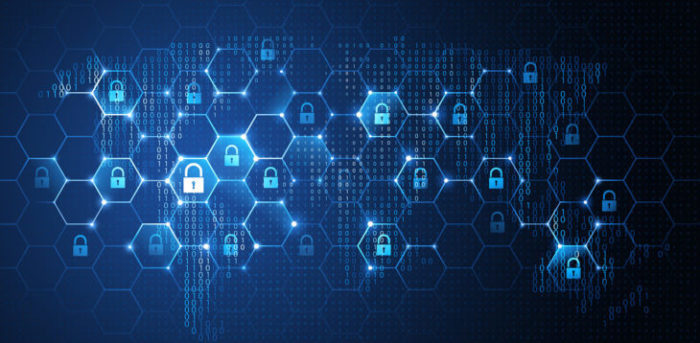The emerging risk associated with cyber threat requires not only better training for seafarers, but also spreading awareness of best cyber security practices, argued Peter Broadhurst, Senior VP of Safety and Security, Inmarsat Maritime, adding that there is still ‘a long way to go’ when it comes to effective cyber protection.
Whether in pursuit of personal data or money, cyber crime is now a big and highly automated business, ready to strike at the most vulnerable part of an organisation’s defences 24/7, anywhere in the world.
Speaking on a panel at the World Economic Forum earlier this year, A.P. Møller-Maersk Chairman Jim Hagemann Snabe revealed that responding to the NotPetya ransomware attack of June 2017 had required the reinstallation of 4,000 new servers, 45,000 new PCs, and 2,500 applications, all within ten days. During this period, the company reverted to manual systems.
In hitting a company equipped with experienced cyber security specialists, NotPetya showed that the cyber threat is as real for shipping as it is for any other connected business, especially where legacy systems proliferate.
If the warning should be sinking in, an Inmarsat Research Programme report, The Industrial IoT on land and at sea (2018) suggests that maritime minds are slow to change. The unique study drew on testimony from 750 survey respondents across a range of industries to establish preparedness and perceptions regarding the adoption of IoT-based solutions.
The survey found 87% of maritime respondents saying they believed that their cyber security arrangements could be improved. It also saw more of them identifying data storage methods (55%), poor network security (50%) and potential mishandling/misuse of data (44%) as likely to lead to breaches in cybersecurity than outright cyberattack (39%).
Given the self-diagnosis, it is perhaps surprising to find that only 25% of maritime respondents said they were working on new IoT-based security policies.
In fact, Inmarsat’s research exposed ambivalence as one of shipping’s leading feelings towards IoT-based solutions. With some owners engaging at the level of blockchain, others take their lead from their need to comply with regulation: this is an industry which simultaneously sustains just over 30% of shipping respondents as ‘IoT leaders’ and just under 30% as ‘IoT laggards’, the report says. For every owner signed up to the benefits of condition-based monitoring and predictive maintenance based on real-time connectivity, there appears to be another for whom maintenance is something that takes place at regular and predictable intervals, or whenever is most convenient.
Inconsistent views on cyber security also appear free to coexist with immature ones. Around 70% of respondents identify reducing marine insurance premiums as a main driver for IoT uptake, where insurers have shown themselves as especially sensitive to cyber threats. At the same time, other studies have found attitudes such as “I’m not the target /we have security in place, don’t we?/I will be protected by AntiVirus” alive and well among seafarers.
For those prepared to engage in the IoT, ships today sustain crews in small numbers, representing both an opportunity and challenge for automation, and indeed for cyber security. On the one hand, low crew numbers align strongly with operational technology that is remotely updated, self-managing and supported by automated security and from third parties and OEMs, such as voyage planning, weather routing, navigation, fuel management, etc. On the other hand, the opportunities to ‘patch’ embedded operational technologies (OT) safely are not frequent, and patches usually require certification by control system manufacturers.
The broader point, though, is that cyber security is not just about software patching and systems configuration. Ship operators do not buy computer processors, disk storage and software and then build them into a system: they procure turnkey systems. Again, shipboard engineers may well be IT-literate, but no space has been made on the crew roster for cybersecurity specialists.
In these circumstances, the integrity of the systems on ships is best maintained by software which can identify, contain and resolve threats wherever they appear in the network. Such Unified Threat Management (UTM) detects all deviations from the ‘known good’ configuration as anomalies and potential threats to security and can update securely, even during operation. Some specialist functions such as a deep analysis of alerts or security forensics will need to be delivered remotely.
Inmarsat believes that a collaborative approach – that includes shipboard systems, but also the crew operating them and the processes involved – is vital to develop the maturity response demanded by multiple threats from cyber villains, whatever their origin. For this reason, we have been working with some of the best security-focused experts available to tailor products and services to meet shipping’s requirement.
As noted, however, software is only part of the answer: cyber security and vigilance for ‘the human element’ and a well thought-out recovery strategy to mitigate against multiple, automated assaults are also critical. Failures in processes and mistakes by people can present the security loophole that, if unchecked by the UTM, compromise the entire network.
Weaknesses at the first line of defence (to phishing, plugging infected USB in, downloading from untrusted source etc.) are common but, in the case of satellite-connected ships, it is also common to see updates turned off and no AV software in operation. Today, cyber security training is not compulsory for the world’s 1.6 million seafarers, while expertise in antivirus software is inevitably more likely to be based ashore.
As far as awareness is concerned, it is fair to say that there is likely to be more temptation to risk plugging in a memory stick that might be infected once a vessel is under way. Creating awareness for seafarers and staff is a continuous task because good cybersecurity practice is shipping’s first line of defence against ‘attack’.
Inmarsat recently participated in discussions with academics at the World Maritime University in Malmö over what future classroom-based and e-learning cyber security course content might include for Maritime Safety and Security Diploma students.
Inmarsat is not and does not aspire to be a training company, but it is an interested party. As such, we are fully aware that training is not just a tick box exercise and must be backed up with monitoring and reinforcement. We also know that using tools to identify breaches of policies such as USB usage help reinforce the message: constant reminders and real-life examples are often the quickest ways to stop bad practice.
But to address the cyber security risks of the future effectively, we need the involvement of ship designers, builders, regulators, verifiers, equipment manufacturers, service providers and, of course owners and operators. We were therefore one of the founding partners in a Joint Working Group run by the International Association of Classification Societies (IACS) whose members survey and certificate more than 90% of the world’s commercial vessels, ensuring that ships are fit-for-purpose and comply with safety and quality regulations.
The Working Group, which includes representatives from across the maritime sector, has developed a cyber security framework that is likely to form a basis for risk management that will contribute to future seafarer training requirements and the International Maritime Organization’s (IMO) International Safety Management (ISM) Code, a standard for the safe operation of ships. A further outcome is likely to be a recommendation relating to how a cyber security module can best be integrated into standard seafarer training courses, probably as part of the Standards of Training, Certification and Watchkeeping (STCW) Code.
There is no doubt that digitalisation and new smart technologies are transforming ship operation at an exponential pace but Inmarsat’s view is that, to accelerate this transformation, all stakeholders interested in optimising the efficiency of ships and crew welfare must exert themselves if the industry is to be carried over the line.
This means we must not only be training our seafarers more effectively, better managing our processes and protecting our systems, but nurturing awareness of best cyber security practice even on vessels that have little or no cyber security protection at all. Clearly, there is a long way to go.
By Peter Broadhurst, Senior VP of Safety and Security, Inmarsat Maritime
The views presented hereabove are only those of the author and not necessarily those of SAFETY4SEA and are for information sharing and discussion purposes only.
About Peter Broadhurst
 Peter is an experienced Sales, Marketing and General Manager with a technical background and over 25 years’ working in the Maritime industry. A proven track record of leadership, mangement, global and regional sales, business development, marketing and product development. Experienced in both business-to-business and business-to-consumer distribution channels driving expansion and market growth. Currenly, Peter is the SVP Safety and Security at Inmarsat Maritime.
Peter is an experienced Sales, Marketing and General Manager with a technical background and over 25 years’ working in the Maritime industry. A proven track record of leadership, mangement, global and regional sales, business development, marketing and product development. Experienced in both business-to-business and business-to-consumer distribution channels driving expansion and market growth. Currenly, Peter is the SVP Safety and Security at Inmarsat Maritime.

































































